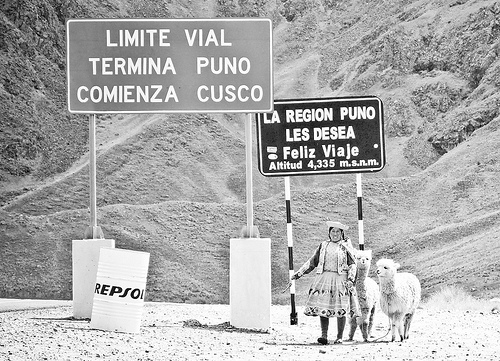Through the enforcement of recent statutes put in place, little by little peace is being restored in the Puno region, situated at the south of the Peruvian Andes, after recent conflict and social unrest (both related to mining [es]), that resulted in the deaths of six, more than 30 wounded and millions in material losses: the Juliaca Airport alone suffered an estimated 2 million dollars in damages [es].
Quechua residents of Azángaro (north of Puno) left Juliaca on Saturday night and the Aymara in the south of the region lifted the blockades on the streets on Sunday.

Road between Puno and Cusco blocked by Aymara in days past. Photo by Juanma Merino, Flickr user, nXpected (CC BY-NC-SA 2.0).
These native communities of the mining region of the Ramis River have given a temporary truce to President elect Ollanta Humala's government, during which related issues concerning mining concessions are in the process of revision [es] in the southern zone of Puno. In the meantime, Humala has declared it a “constitutional responsibility of the present government” [es] to resolve the problem by July 28 when its term ends.
One of the enforced statutes declares the environmental recuperation of the Ramis and Suche [es] river basin a national interest [es], a greatly expected measure for the peasant residents of the area; the rest are associated with the regulation of mining activity [es] in the Puno region. The most commendable, for the Aymara community, is the repeal of Supreme Decree 083-2007-EM, that puts an end to the Santa Ana project [es] of the Bear Creek Mining Company.
Social networks are buzzing with commentary.
Some are strongly in agreement with the claim of the people of Puno, like Ricardo Calmet (@ricardocalmet):
@jotabruce@chaskicholo Hay mucho que aprender de los pueblos originarios. Mirándolo bien Aymaras nos dan profunda lección: cuidar la tierra
Jimena Espinoza (@jespiba) supports the Puno people's protest:
Deberiamos movilizarnos como muestra de apoyo a nuestros hermanos puneños que son ignorados por el gordo infeliz [el presidente Alan García] bit.ly/kBRp94
Another sector maintains that the people of Puno are boycotting themselves, such as Alian Molina (@aliomp):
Figueroa: “Los aimaras y quechuas no desean que haya desarrollo en su región”
In this same vein, this tweet from Ricardo Marapi (@ricardomarapi) puts emphasis on the conflict between the Puno people themselves:
En Puno “habría celos vecinales, por la desigualdad entre los poblados en el reparto de los beneficios” http://is.gd/2R7M4x
Others doubt the sincerity or legitimacy of the claims, like Shevyga (@Shevyga):
Si la gente Aimara pelea x la mineria “formal”, la gente de Azangaro pelea x la mineria informal, pero…
Some users question the management of the central government on environmental issues, like Luis Torres Montero ():
Defensoría del Pueblo tiene 87 meses de informes de conflictos sociales (incluido el de Río Ramis) y Alan García ‘naca la pirinaca’ [no hace caso].
Others accuse the government of discrimination and negligence, like Internautilius ():
Ahora entiendo porque dicen Peru no tiene instituciones: la Fiscalia de Puno no investiga la muerte de los punenos! Los muertos son pobres!!
Other Twitter users accuse the press of not covering the conflict in the region properly, like Matteo (@Matteo):
RM Palacios [Rosa María Palacios, periodista peruana] vuela en prejuicios y acusa de racistas a los quechuas y aimaras de Puno goo.gl/TRl5o
As far as the change of leadership is concerned, which will take place on the July 28, analysts like Paula Vilca highlight some of the tasks left in suspension [es] in the region for Ollanta Humala's government, focusing on reaching permanent solutions in the region. These include: enforce the Law of Prior Consultancy, eliminate informal mining in the zone of conflict, (which means to legitimise it), implement a plan for territorial restructuring and recuperate the natural environment of the Ramis River basin which affects the Titicaca Lake.







1 comment